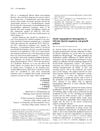 16 citations,
March 2015 in “Wiener Klinische Wochenschrift”
16 citations,
March 2015 in “Wiener Klinische Wochenschrift” Vitamin D deficiency is common in women with PCOS and linked to some metabolic problems, but not the main cause of their metabolic issues.
 14 citations,
September 2014 in “Journal of Pediatric and Adolescent Gynecology”
14 citations,
September 2014 in “Journal of Pediatric and Adolescent Gynecology” Irregular menstrual cycles in teenagers are linked to a higher risk of polycystic ovary syndrome and metabolic syndrome.
 14 citations,
January 2012 in “Endocrine development”
14 citations,
January 2012 in “Endocrine development” The conclusion is that a thorough approach is needed to diagnose and manage hyperandrogenism in teenage girls, recognizing its major psychological and health effects.
 9 citations,
March 2020 in “Gene”
9 citations,
March 2020 in “Gene” Certain gene variants in estrogen receptors are linked to polycystic ovary syndrome, mainly affecting metabolism, in Tunisian women.
 8 citations,
August 2007 in “Histopathology”
8 citations,
August 2007 in “Histopathology” Different growth patterns in thyroid tumors are influenced by where cell growth and death occur.
 7 citations,
June 2015 in “The American Journal of the Medical Sciences”
7 citations,
June 2015 in “The American Journal of the Medical Sciences” Finasteride helps reduce blood vessel growth in diabetic rat kidneys.

People with psoriasis have more health problems, including autoimmune diseases, than those without it.
 January 2023 in “Our Dermatology Online”
January 2023 in “Our Dermatology Online” An old recipe called "Champigny Saumure" might help treat a rare scalp condition.
1 citations,
December 2013 in “BMJ case reports” A pregnant woman with Werner's syndrome died during childbirth, but her baby survived and did not have the syndrome.
 88 citations,
May 2011 in “British Journal of Clinical Pharmacology”
88 citations,
May 2011 in “British Journal of Clinical Pharmacology” High doses of cyproterone acetate are linked to an increased risk of developing meningioma.
 59 citations,
March 2013 in “European Journal of Obstetrics & Gynecology and Reproductive Biology”
59 citations,
March 2013 in “European Journal of Obstetrics & Gynecology and Reproductive Biology” People with polycystic ovary syndrome have a higher chance of having chronic thyroiditis.
 49 citations,
December 2017 in “Journal of pharmaceutical and biomedical analysis”
49 citations,
December 2017 in “Journal of pharmaceutical and biomedical analysis” The method effectively detects banned substances in urine for sports antidoping.
46 citations,
June 2013 in “Journal of structural biology” High glycine–tyrosine keratin-associated proteins help make hair strong and maintain its shape.
 29 citations,
June 2017 in “Journal of Inherited Metabolic Disease”
29 citations,
June 2017 in “Journal of Inherited Metabolic Disease” High-content screening is useful for finding new treatments for rare diseases and has led to FDA-approved drugs.
 26 citations,
November 2016 in “European Journal of Clinical Pharmacology”
26 citations,
November 2016 in “European Journal of Clinical Pharmacology” Valproic acid helps delay hair loss and increases survival time for high-grade glioma patients undergoing radiation therapy.
 26 citations,
June 2014 in “Fertility and Sterility”
26 citations,
June 2014 in “Fertility and Sterility” Teens with PCOS and a mom with PCOS have higher insulin resistance and lower adiponectin levels, which could signal early metabolic problems.
 21 citations,
September 2019 in “Archives of Physiology and Biochemistry”
21 citations,
September 2019 in “Archives of Physiology and Biochemistry” High-intensity interval training improves certain hormone levels and lipid profiles in women with PCOS.
 21 citations,
August 2014 in “Gynecological Endocrinology”
21 citations,
August 2014 in “Gynecological Endocrinology” Higher hs-CRP levels in Indian adolescent women with PCOS are more related to BMI than PCOS itself.
19 citations,
January 2013 in “Annals of Dermatology” Early high-dose steroid treatment helps prolong disease-free periods in severe alopecia areata.
 17 citations,
March 2016 in “Liver international”
17 citations,
March 2016 in “Liver international” Men with advanced liver disease and high oestrone and low testosterone levels have worse health outcomes.
 16 citations,
September 2016 in “Neuropharmacology”
16 citations,
September 2016 in “Neuropharmacology” Activating TSPO helps protect the retina from damage caused by high eye pressure in glaucoma.
 9 citations,
January 1999 in “Journal of Liquid Chromatography & Related Technologies”
9 citations,
January 1999 in “Journal of Liquid Chromatography & Related Technologies” Best results found using acetonitrile, water, and trifluoroacetic acid or methanol mixture.
 5 citations,
July 2014 in “Acta Crystallographica Section D-biological Crystallography”
5 citations,
July 2014 in “Acta Crystallographica Section D-biological Crystallography” Mutations in the enzyme don't significantly change how it binds to its specific substances.
 4 citations,
March 2021 in “Postepy Dermatologii I Alergologii”
4 citations,
March 2021 in “Postepy Dermatologii I Alergologii” High-frequency ultrasonography can be a useful tool for diagnosing different stages of alopecia areata, a type of hair loss.
 3 citations,
August 2019 in “Journal of The American Academy of Dermatology”
3 citations,
August 2019 in “Journal of The American Academy of Dermatology” Higher doses of spironolactone may improve acne in PCOS patients, but side effects are a concern.
 3 citations,
April 2019 in “Hormone and Metabolic Research”
3 citations,
April 2019 in “Hormone and Metabolic Research” Women with PCOS have lower adiponectin hormone levels and are more likely to have insulin resistance.
 3 citations,
December 2016 in “Canadian Urological Association journal”
3 citations,
December 2016 in “Canadian Urological Association journal” Men with more advanced male pattern baldness have a higher risk of prostate cancer and more severe disease.
 3 citations,
February 2016 in “Pediatric dermatology”
3 citations,
February 2016 in “Pediatric dermatology” Strong skin creams work well for long-term scalp inflammation in Rapp-Hodgkin Ectodermal Dysplasia.
2 citations,
June 2021 in “Medicine” High levels of cortisol in hair are linked to a greater risk of brain aneurysm rupture.
 2 citations,
December 2017 in “Journal of The American Academy of Dermatology”
2 citations,
December 2017 in “Journal of The American Academy of Dermatology” The article suggests that five common skin-related lab tests may be unnecessary and could cause extra cost and anxiety without improving patient care.

























